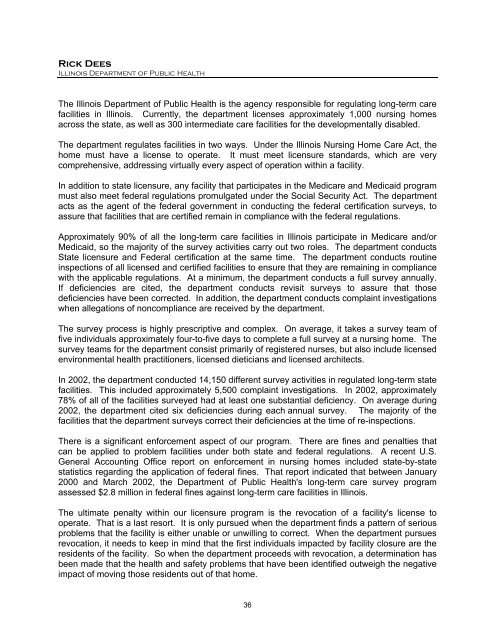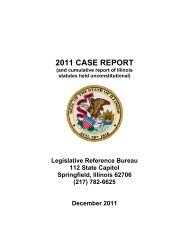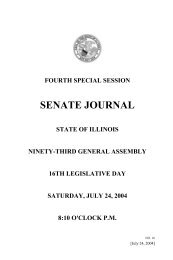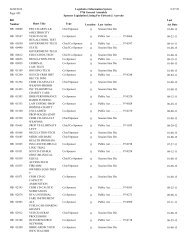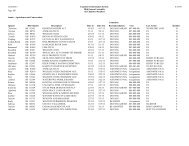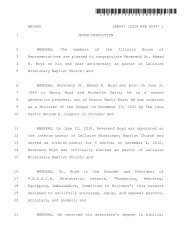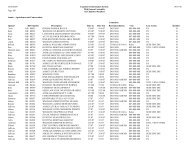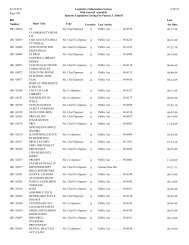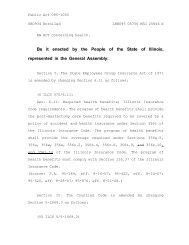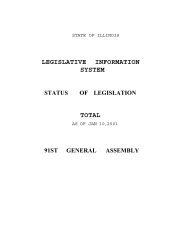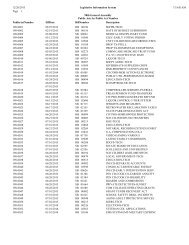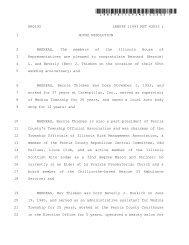Long-Term Care - Illinois General Assembly
Long-Term Care - Illinois General Assembly
Long-Term Care - Illinois General Assembly
You also want an ePaper? Increase the reach of your titles
YUMPU automatically turns print PDFs into web optimized ePapers that Google loves.
Rick Dees<br />
<strong>Illinois</strong> Department of Public Health<br />
The <strong>Illinois</strong> Department of Public Health is the agency responsible for regulating long-term care<br />
facilities in <strong>Illinois</strong>. Currently, the department licenses approximately 1,000 nursing homes<br />
across the state, as well as 300 intermediate care facilities for the developmentally disabled.<br />
The department regulates facilities in two ways. Under the <strong>Illinois</strong> Nursing Home <strong>Care</strong> Act, the<br />
home must have a license to operate. It must meet licensure standards, which are very<br />
comprehensive, addressing virtually every aspect of operation within a facility.<br />
In addition to state licensure, any facility that participates in the Medicare and Medicaid program<br />
must also meet federal regulations promulgated under the Social Security Act. The department<br />
acts as the agent of the federal government in conducting the federal certification surveys, to<br />
assure that facilities that are certified remain in compliance with the federal regulations.<br />
Approximately 90% of all the long-term care facilities in <strong>Illinois</strong> participate in Medicare and/or<br />
Medicaid, so the majority of the survey activities carry out two roles. The department conducts<br />
State licensure and Federal certification at the same time. The department conducts routine<br />
inspections of all licensed and certified facilities to ensure that they are remaining in compliance<br />
with the applicable regulations. At a minimum, the department conducts a full survey annually.<br />
If deficiencies are cited, the department conducts revisit surveys to assure that those<br />
deficiencies have been corrected. In addition, the department conducts complaint investigations<br />
when allegations of noncompliance are received by the department.<br />
The survey process is highly prescriptive and complex. On average, it takes a survey team of<br />
five individuals approximately four-to-five days to complete a full survey at a nursing home. The<br />
survey teams for the department consist primarily of registered nurses, but also include licensed<br />
environmental health practitioners, licensed dieticians and licensed architects.<br />
In 2002, the department conducted 14,150 different survey activities in regulated long-term state<br />
facilities. This included approximately 5,500 complaint investigations. In 2002, approximately<br />
78% of all of the facilities surveyed had at least one substantial deficiency. On average during<br />
2002, the department cited six deficiencies during each annual survey. The majority of the<br />
facilities that the department surveys correct their deficiencies at the time of re-inspections.<br />
There is a significant enforcement aspect of our program. There are fines and penalties that<br />
can be applied to problem facilities under both state and federal regulations. A recent U.S.<br />
<strong>General</strong> Accounting Office report on enforcement in nursing homes included state-by-state<br />
statistics regarding the application of federal fines. That report indicated that between January<br />
2000 and March 2002, the Department of Public Health's long-term care survey program<br />
assessed $2.8 million in federal fines against long-term care facilities in <strong>Illinois</strong>.<br />
The ultimate penalty within our licensure program is the revocation of a facility's license to<br />
operate. That is a last resort. It is only pursued when the department finds a pattern of serious<br />
problems that the facility is either unable or unwilling to correct. When the department pursues<br />
revocation, it needs to keep in mind that the first individuals impacted by facility closure are the<br />
residents of the facility. So when the department proceeds with revocation, a determination has<br />
been made that the health and safety problems that have been identified outweigh the negative<br />
impact of moving those residents out of that home.<br />
36


